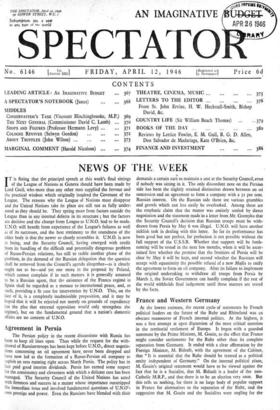NEWS OF THE . WEEK I T is fitting that the principal
speech at this week's final sittings of the League of Nations at Geneva should have been made by Lord Cecil, who more than any other man supplied the fervour and the practical wisdom which originally inspired the Covenant of the League. The reasons why the League of Nations must disappear and the United Nations take its place are still not as fully under- stood as they should be. They spring more from factors outside the League than in any internal defects in its structure ; but the factors are decisive and the change from League to U.N.O. had to be made. U.N.O. will benefit from experience of the League's failures as well as of its successes, and the best testimony to the soundness of the older body is that the newer so closely resembles it. U.N.O. is now m being, and the Security Council, having emerged with credit from its handling of the difficult and potentially dangerous problem of Russo-Persian relations, has still to tackle another phase of the problem, in the demand of the Russian delegation that the question shall be removed from the Council's agenda altogether—as it clearly ought not to be—and yet one more in the proposal by Poland, which cannot complain if in such matters it is generally assumed to be a Russian agent, that the existence of the Franco regime in Spain shall be regarded as a menace to international peace, and, as such, providing a fit case for intervention by U.N.O. This, on the face of it, is a completely inadmissible proposition, and it may be hoped that it will be rejected not merely on grounds of expediency (on the plea that external opposition would only strengthen the regime), but on the fundamental ground that a nation's domestic affairs are no concern of U.N.O.


























